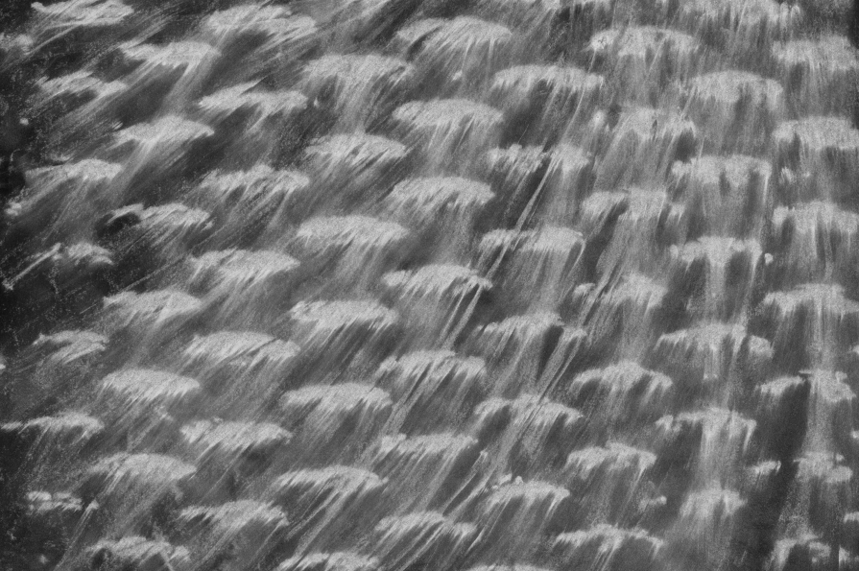|
The Programme |
Scene One:Escape
|
The Players |
Supporting Cast |
|
The Players
|
METAL
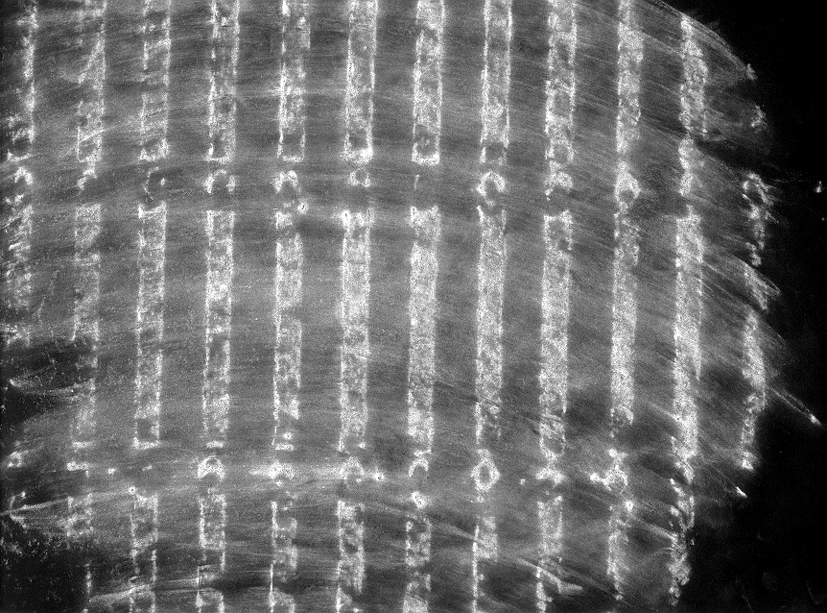
|
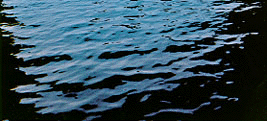 WATER
WATER
|
Schist
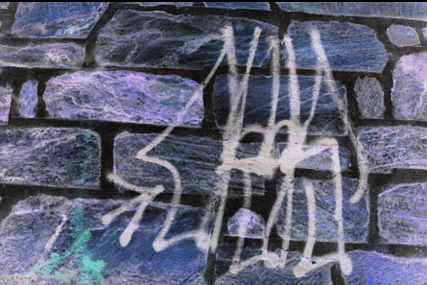
|
 Rust
Rust
|
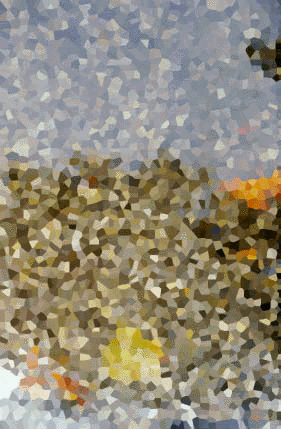
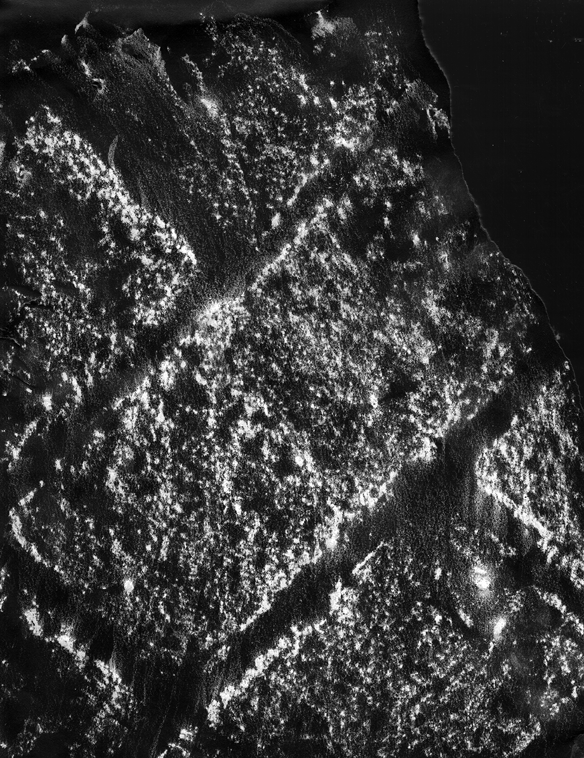 Cobbles
Cobbles
Grass

|
 Plants
Plants |
Mist

|
 Drains
Drains
|
|
And a Special appearance by:
Acrylic Polymer
| 
|  and with:
People
and with:
People
| |
|
SCENE ONE: Fait accompli |
Dawn into afternoon. A day in late autumn. The wan sunlight washes against the straight, linear sidewalks and building lines of forty-seventh street. All is greying steel, powdering concrete, brick, asphalt & gravel. The avenue is firmly in the grip of metallic elements. It is a street like any other found in the city. Iron railings. Concrete pillars. Metal hydrants and gutters, curbs, covers, grates, hatches and plates everywhere control the air, the water, the nature and life around them. Stones and cements, conglomerates and aggregates are stretched taut over the landscape. Geometric forms: squares, rectangles and octagons and angles rule here. Small parcels of open soil battle against alkalai produced by the concrete. Here and there hardy pockets of street vegetation eke out a short-lived existence. All is hard, rigid, impermeable, sealed and unyielding around them.
Night falls. Except for the activity of autos (more metal), passers-by, and children playing there is quiet. Then a murmur of thunder is heard in the western sky. Rain is falling on the uplands but it is still dry here. People linger outside. The scene repeats itself. Lightning flashes. Clouds rush across the sky. Sparrows wheel in numbers over a school baseball field. |
|
SCENE TWO: Capture | A fortnight later. Volumes of imprisoned water stream listlessly through the dark underground tunnel of the Mill Creek district Storm Sewer. Every freshet of the coursing water seeks some small crack or fissure in the cut schist block by which it can escape from the tunnel and out into the soil where green things grow and where it can do its work. The water knows it is night above from the temperature of its body. But unaccountably, at this hour, there is a strange clamor of men working and metal striking metal. The waters that hear this pass the word back down the line for the rest of the stream. |
|
SCENE THREE: Plight & Premonition
|
A few weeks around the same calendar date next year. The water has learned too well what the commotion on the street surface had been about. Metal--insidious, rapacious, metal--had made tremendous advances in territorial gain during the past year. It was even more thickly about the environment than ever. Its spiky forms cast cold shadows everywhere; rang angrily when struck, imprisoned creatures of every sort and in general bred caution and respect in everyone. Cold slick grating had been applied to the streets in a way that at first had confused water. By allowing rain to fall directly through the holes in the grate drops were fed straight into the ground instead of being hurried along the pavement to the drains. Why would metal be a party to this? Water from the runoff of urban streets would now have time to gather and conspire. The sand that water constantly bore along on its body would deposit and create small pools beneath the sidewalk and the street. Then water saw that metal controlled the drains at the end of these passages. The pipes in fact led only to a deep dark iron cistern beneath the ground. There was other construction water had discovered as well in the past year-but their purpose was still unclear. Water could do nothing at this time but gather in secret and gain hope by the fact that the green spirits were already beginning to seed in and around its pools. Soon the grasses and maybe small shrubs would grow high enough to poke their heads out of the top of the grate. Water could sense humans passing to and fro up there, and even hear the laughter of children. It was in these moments that water's enmity for metal knew no bounds. Instead of being free and part of the rest of the life of the city water was caged and imprisoned. The tiny workers' lights installed in the dark channel seemed to mimic water's hatred with a sickly, greenish glow. |
|
ACT TWO: |
|
SCENE ONE:Escape |
It began one evening later that spring. Rain had been falling steadily throughout the morning and afternoon and when the murky dusk finally fell water began to make its move. It had discovered months before that there were now two routes open to it that diverged just north of the school on 48th street. It was decided that some of the run-off from the street should not secret itself in the sand pools beneath 47th street but stay in the normal storm sewers and flow into the new drains between the school and the playground. The construction there was certainly unusual--strange schist discs had been inserted into the street and sidewalk outsider the narrow throughway between the school and the playground. Water liked their round shape. Outside the rain continued to fall--it was fully dark now. Water began to move. It crept down into the storm pipe and let gravity carry it downward, into a pitch black chasm . . . At the critical juncture water diverted into the new drains. There seemed to be two of them. Excitedly, water could sense open space just beyond. But in the bigger of the two pipes water sensed the cold presence of metal. What to do? Through a large drain much water could be set free--but was it safe? Suddenly water heard the furtive whisper of one of the schist discs. "Examine the second drain," schist said. "There is no metal there-- except for some thin steel wire you can easily slip by. The drain is made up of rocks from my body--you may reach the other side by trickling between." Water looked and found it was as schist said. There was a way through. Now there was no time to be lost. It entered the drain and after a few moments of maneuvering through the rubble emerged into the open. Suddenly, water saw three metal guards! Had the escape been discovered? They seemed asleep--no alarm was raised. Perhaps they were only dumb sentries put in place until some major event occurred. Water decided it was safe to continue. Eventually the whole force found itself a pooling area directly across from the school. The water stilled, calmed, and revived in the open air. It slowly moved the rest of its forces out through from the storm sewer system into the new greensward behind the school and paused again to rest. In the excitement of escape, of the sudden confrontation with the steel guards the water had momentarily forgotten that it was schist itself which had provided the outlet. "Surely against its better judgment," the water thought. "Schist has no reason to help me-it is the close kin to metal. It is as much man's tool as steel or iron which oppresses us." Nevertheless, tired as the water was, it found time as it reflected on its changed fortunes to converse with the rocks that had been fashioned by men into a beautiful little walled seep. The water sat calm and limpid between the twin revetments like a child between two parents and listened to what schist had to say. Metal, Schist contended, was not wholly what water made it out to be. Metal simply obeyed its own nature like all other things. The way of metal is to contain and surround, or to be used as a tool. It was as much a slave to higher powers as any other entity. The water was to tired to speak. It rested and occasionally found the strength to give spirited rebuttal--but this was conversation no mortal ears shall ever hear. And if the opinion of water concerning all the things man-made and man-used did not change it was ameliorated somewhat--for the time being. |
|
SCENE TWO: Entangled | The place that water found itself in was a gently curving, grassy incline flanked by large sycamore trees on one side and the massive linear form of the school on the other. The tiny double-walled pool occupied the center. Water was gradually creeping up the levels of this pool as the spring rains increased. Soon it became bold enough to venture out; puddling out in tentative gestures until it reached the narrow entrance of the bottom of the expanse. There the slope continued on through a small crevasse--but water could see it opening out beyond. And water saw something else as well--there were real metal guards down there--big ones, with menacing features and hard, rigid bodies. Water's spirits sank. There was nowhere else for it to go. It could practically taste the foul metal flavour that would fill its body when the slope forced it to pool around the ugly behemoths. Water looked frantically around for a means of escape. There was no going back--some of the water had reached a level change and was now flowing down towards the lower pool. The guards made no sign that they noticed. Small puddles began to form around their feet. Then water noticed a very small outlet pipe nestled sunk midway up the wall in the deepest part of the basin. It was made of a material water had never before encountered: smooth and glossy and rounded. Where did it lead? There would not be a chance to find out until later that spring when the rains would push the water up to that height. The metal guards would have to be endured until then.
Later that spring. Water discovered many things while it waited for its level to rise that season. It found that the surface of the metal guards began to turn a dull orange color after being in contact with the water's body. Pieces of that material then began to flake off. Water had turned it around in its grasp. It was called rust, it said. It showed water that in fact it had some power to defend itself against metal--if it had the stomach for it. "There's a place nearby where water-eaten metal is heaped in a huge pool for children and water to play over. If you stay here with me and help me get along I will tell you where." Water didn't believe this story, and in any case was of no mind to stay in this place. But rust did give water something to think about. Water also found companionship in the sand grains and grass shoots that began to fill in the bottom of the slope behind the school. The sand told water that the pipe of strange material led nowhere but to the same deep, dark cistern that the channel -below-the-sidewalk led to. Water heard this with dismay. It seemed there really was no way out. Then an interesting had thing happened: the first small shower fell directly onto the pool from the open sky. The young droplets had seen the whole area from above as they were falling and told water that directly across the intersection where the huge cistern grates were located there was a strange, constructed place where clear, clean blue water reposed in a huge pool and where the neighborhood's children came to play. There was also rich hosts of the green spirits--plants, grass, shrubs, and hedges that the water made fertile. Water was even raised up high in some curious clear polished globes and at times would come splashing down in what seemed the greatest delight. "Where does that water come from?" water wanted to know. The young rain had no answer. Somewhere underground, it thought. Finally the water reached the point where it could begin to investigate the pipe. It was neither metal or water; not hard, but not totally soft. Sand was right-- it did lead directly into the cistern. There was no choice but to go on. |
|
SCENE THREE: Skipjack / De Ja' Vu |
Skipjack was from N'awleans. Been livin' there ever since he'n Ruthie'd split up. He was in his twenties then: he'd married young to a girl from the neighborhood. Then, like so many others, he'd felt the need to move on. She hadn't come with him. She rather'd stay in a place like this and raise kids. The tug was still there--she had been pretty. But that wasn't enough. Didn't seem to matter to him then that this was the place he'd grown up in, either. Maybe others came back; came back to stay. He didn't know. He hadn't been back in years and now it was only on business. Main office had sent him--him!--north on an errand to a freezing plant they shipped to up here. Freezin'. It was one reason he'd left Philly. Hated the cold. He worked on shrimp boats fifteen years and no matter how hard the work was he'd never had numb fingers again when he woke up in the morning. Now he was a supervisor, and had an office. Livin' was pretty good. He played the ponies when he got a little ahead and slept with a good woman when he could find one. He had about the same amount of success with either animal. He was staying in a flop downtown; the drive to the plant in the rented car they'd given him took forty-five minutes and he passed through Mill Creek each way. Daytime he sat bored to tears at a big table with the rest of the management team facing the union committee loudmouths and at night he didn't have much to do. He thought about scouting around his old haunts. He hadn't gone out of his way to avoid the neighborhood but he couldn't think of much he wanted to do there. He'd talked to Ruthie about the boy and he had agreed to meet with him one day while he was on the playground at school--to let him know what his father looked like. That was tomorrow when he he had a day off. Until then he wanted to park the car and take a walk around so when he left the plant that's what he did. Nothing to it. He was bitterly pleased to see that much of the neighborhood was still the same. He even recognized some of the ruins. And there were even more empty patches of ground where homes he remembered used to be. |
|
SCENE FOUR:Flux and Anchor |
Water tumbled into the cistern in a cascade made thunderous by the echoes produced by the metal and stone chamber. It was about ten feet deep, circular, with columns--and black as Hades despite the humans' utility lights ringing the sides. The chamber was sealed tight except for the inlet and outlet ports and the arrangement of street grating that formed the ceiling. Water could see night sky again through the holes. It was worse than water could have imagined. Giant metal plates were fastened to the stone that made up the cistern. Water was hemmed in on all sides and in a constant churn. The cold, metallic taste of steel was everywhere. Along one half of the cistern steam pipes ran and escaping clouds of vaporized water rose hissing through the grate. Water would never get out that way. It would take a lot more water to reach any of the various outlets that water spotted along the rim of the cistern. And before it would rise that high a port halfway up the wall--water sensed that it lead to back to the city storm pipes--would keep it at bay. At that moment water felt itself being sucked into the familiar tornado-shaped eddy from below. It was being drained--to someplace. But where? To be turned into steam? "Don't be afraid," --It was some grass!--grass and sand had already begun to fill in the bottom of the chamber! "You are not here for no good reason--" sand said. "This chamber is built to clean you. That drain takes you to a place for more cleaning. Then it takes you into the city pipes that supply the big pool across the road where you'll be free!" Water splashed and quivered to hear these words. Free!
"There's just one catch," --this was grass--"it means you have to spend quite a lot of time here, in this awful place. It will take you a long time to get out. Can you stand it?" Water didn't know. But it could try if it meant that it could be free--to shine in the brightness that fell from the air and be caressed by the wind and feed the green spirits. Anything was worth that. It might never be reunited with the streams from whence it rose. But it would be useful. That was enough. |
|
ACT THREE: |
|
Denouement:Disturbances in the Field |
What might we learn from the enmity between water and metal? Water, as we saw, discovers that metal, which it thought to be completely alien, is actually made up of some of the same particles as itself. Are there parallels to this in human relations? Seeing the other person's point of view sometimes brings a conflict to resolution. The city of Philadelphia does not see the Mill Creek neighborhood as one that is worth caring about. Yet if they looked carefully at Mill Creek they would discover a part of the city that could be easily made a vital, alive component in the local economy. |
Please mail any comments to: christo2@dolphin.upenn.edu
Last Update: . . .11/27/96
URL: http://dolphin.upenn.edu/gsfa/wplp/courses/~christo2/revolt.htm There are no images within this URL address that infringe upon copyright laws of the United States.
